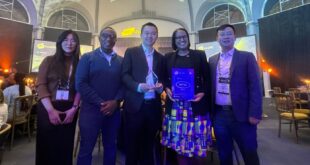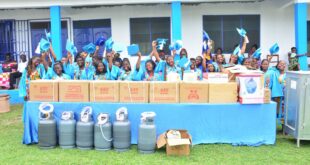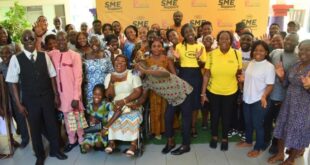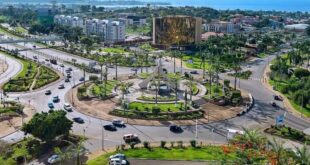 Gushegu, Ghana – The lives of over 12,000 men and women from the Gushegu Municipality and Karaga District in the Northern Region of Ghana, are remarkably being transformed through World Vision’s Savings for Transformation (S4T) component of its Household Food Security and Resilience project.
Gushegu, Ghana – The lives of over 12,000 men and women from the Gushegu Municipality and Karaga District in the Northern Region of Ghana, are remarkably being transformed through World Vision’s Savings for Transformation (S4T) component of its Household Food Security and Resilience project.
In the Gushegu area, 8,279 men and women from a total of 322 groups are benefitting from S4T whereas in the Karaga area, 3,933 men and women from 141 groups benefitting.
S4T is a savings and loans scheme that enables women and men including the youth to save money for future investments and other plans they have. The scheme also enables participating members of the various distinct groups to save money they make from their own investments as a form of social security to fall on in the event of any emergency.
In a field visit to Salaa and Kpatinga, two farming communities in Gushegu, it was obvious to World Vision Ghana and its media team that, lives are being transformed through the S4T model of the Household Food Security and Resilience project.

Fusheni Amina, a livestock keeper and trader at Salaa, said a few years ago, she started kulikuli (groundnuts chips) business with 3 bowls of groundnuts she bought for Gh₵10.00.
Currently, Madam Amina who is about 70years of age has expanded the kulikuli business by increasing the quantity of groundnuts from 3 bowls to 10 bowls.
As if that is not enough, she has now diversified the business by adding livestock rearing. In total, she has 13 matured sheep and goats she takes care of and she attributes her success to World Vision’s S4T.
According to her, the little savings she did overtime with the “Kpangmang-noo-kumiya Bangbihiri niima” group enabled her to expand her kulikuli business and added the livestock rearing to her portfolio. “Through this business, I’m able to take care of myself and also support my two sons with money in their farming every cropping season”, she said in an interview.
The story is not too different with Sumani Sugro, also a farmer in the same community. Previously, the middle-age farmer cultivated only five acres of maize and other crops due to lack of money to hire tractor services and also buy inputs such as fertilizer and weedicides.

But now, he has been able to expand his farms by cultivating 4 acres of maize and 6 acres of groundnuts. He said “I have spent over Gh₵1,000.00 in the 2018 farming season. If everything goes according to plan, I’m expecting about 30 bags of maize and 40 bags of groundnuts”.
Mr. Sugro who is also a member of “Kpangmang-noo-kumiya Bangbihiri niima” group thanked World Vision for the assistance they have given him and many other farmers through the S4T.
At Kpatinga, Tahidu Abdul-Wahid, a father of two and husband of two wives is one of the ‘successful’ mobile money merchants in the whole community which has estimated population of about 1,200 inhabitants.
Besides the mobile money business, Mr. Abdul-Wahid also charges mobile phones for about 200 customers on market days. Unfortunately, there is not a single financial institution in this somewhat bustling farming community which trades in various kinds of food stuffs and wares especially on market days.
 But thanks to World Vision’s S4T initiative, Mr. Abdul-Wahid has over the last one year been able to save enough money in one of the S4T groups and this has enabled him to put up a four bedroom house for his family.
But thanks to World Vision’s S4T initiative, Mr. Abdul-Wahid has over the last one year been able to save enough money in one of the S4T groups and this has enabled him to put up a four bedroom house for his family.
The total assets of the 463 S4T groups in Gushegu and Karaga is Gh₵1,874,031.00. This is a significant achievement by people who hitherto were economically vulnerable due to lack of start-up capital to start a business or expand economic activities they were engaged in.
According to Pastor Joseph Alhassan, Household Food Security and Resilience project, there are many different components under the project including the Savings for Transformation, Farmer Managed Natural Regeneration, Local Value Chain Development and Child Protection and Advocacy among others.

The overall goal of the project, he says is to ensure that, all children especially the most vulnerable and their families, have improved household food security and resilience.
Among other objectives, he indicates that the project also intends to increase food crops production and livestock among beneficiaries, increase their resilience to economic shocks and increase economic opportunities for women and young people.
By Savannahnewsonline.com/Philip Liebs
 Savannah News Online Reporting Only What Matters Most
Savannah News Online Reporting Only What Matters Most



